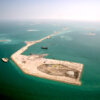Planning is the visualisation of the anticipated progress of the project in order to organise and connect activities in a logical way.
Reasons for planning
The aim of planning varies from one situation and work phase to the other. The most important reasons for planning are:
- progress control in order to compare the actual progress of a project with the planned progress to make adjustments where necessary;
- marking milestones to show that (parts of) the project will finish on time;
- managing the use of resources;
- to find the optimum working method;
- establish communications especially with the client;
- as a contractual tool for identifying and managing changes;
- to assist in the control of project costs.
Planning phases
The planning to realise a project falls into three phases:
- preparation;
- construction;
- maintenance.
Preparation
Preparation begins after the award of the contract, and good preparation is the key to a successful execution of the project. It will guide the way for all aspects of construction and maintenance.
Construction
To move into the construction phase, detailed specifications and contract document must be prepared and used to solicit tenders for the works.
This step may be supported by an expert consulting firm to assist in creating the tender documents and evaluating the submitted bids.
The owner of the project must ensure that there is a structure for the administration of the contract and an inspection system is in place.
Maintenance
The maintenance phase occurs after the completion of construction. However, a major dredging project should also plan for maintenance dredging as based on experience and collected data predicting plausible siltation and other depreciation of a project is possible.

























